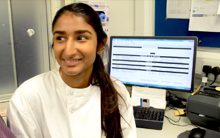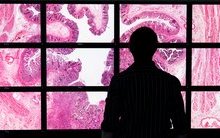The College’s Trainees' Research Medals are awarded annually for outstanding research work undertaken by pathologists or scientists in training.
The main aim of awarding the medals is to recognise and reward the best of the excellent science that College trainees publish, encouraging them in their research careers
A Gold Research Medal is awarded for the best research published overall.
Specialty Research Medals are awarded to the best candidates in each of the major specialties of the College. The specialties for which the medal is awarded are:
- Clinical Biochemistry
- Medical Microbiology and Virology
- Cellular Pathology
- Haematology
- Smaller specialties: Immunology, Allergy, Toxicology, Veterinary Pathology, Embryology and any other specialties that fall within the training schemes of the College.
Medals are assessed for:
- potential benefits to the public and patients
- impact on the field
- contribution of the individual to the paper.
Medals are awarded for research published in each of the specialties for the relevant year (1 July - 30 June, 2019 - 2020) and will be presented at a College ceremony in 2021.
The paper or a related extract by the overall winner (recipient of the gold medal) will be published on the College website and/or in the College Bulletin.
The aims of the Royal College of Pathologists’ Research Medals scheme are:
- to enhance the CV of the successful individuals improves their chances of external research awards
- ultimately, to increase research activity within pathology
- to enhance the status of the research of pathology trainees, both within and outside the College
- to help identify the future research stars that will provide the next generation of leadership in research
- to generate positive publicity and the value trainees gain from the College.
The 2018/ 2019 winners
Gold medal
Histopathology
- Dr Sarah Aitken - CTCF maintains regulatory homostasis of cancer pathways Genome Biology (2018).
- Name of publication - Genome Biology (2018).
Sliver medals
Chemical Pathology
- David Church - Assessment and Management of Anti-Insulin Autoantibodies in Varying Presentations of Insulin Autoimmune System.
- Name of publication - Journal of Clinical Endocrinology & Metabolism (October 2018).
Histopathology
- Dr Harry R Haynes. shRNA-mediated PPARa knockdown in human glioma stem cells reduces in vitro proliferation and inhibits orthotopic xenograft tumour growth.
- Name of publication - Journal of Pathology (April 2019).
Medical Microbiology
- Dr Edward Bevan - Acquisition and Loss of CTX-M-Producing and Non-Producing Escherichia coli in the Fecal Microbiome of Travelers to South Asia.
- Name of publication - mBio (November/December 2018).
Haematology
- Dr John Jones - Clonal evolution in myeloma: the impact of maintenance lenalidomide and depth of response on the genetics and sub-clonal structure of relapsed disease in uniformly treated newly diagnosed patients.
- Name of publication - Haematologica (February 2019).
Clinical Immunology
- Dr. Rohit Ghurye - Novel ADA2 mutation presenting with neutropenia, lymphopenia and bone marrow failure in patients with deficiency in adenosine deaminase 2 (DADA2).
- Name of publication - British Journal of Haematology (March 2019).
Who can apply?
The awards are open to all trainees or scientists registered with the College or a UK Regulatory Council for training purposes during the year the submitted paper was published. The article must either have been either published or accepted for publication by a peer-reviewed journal.
Applications are invited for research published 30 June - 1 July (2019 - 2020). The closing date for applications is 31 August. For more details and how to apply visit Trainee Research Medals.







